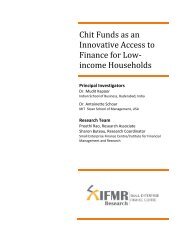Government of India Volume I: Analysis and Recommendations
Government of India Volume I: Analysis and Recommendations
Government of India Volume I: Analysis and Recommendations
You also want an ePaper? Increase the reach of your titles
YUMPU automatically turns print PDFs into web optimized ePapers that Google loves.
CAPITAL CONTROLS<br />
2. Absence <strong>of</strong> judicial review: Currently, for violations <strong>of</strong> any regulations, direction or contraventions<br />
<strong>of</strong> ‘conditions subject to which any authorisation’ is issued by the RBI, administrative hearings<br />
are conducted by first, ‘adjudication <strong>of</strong>ficers’ <strong>and</strong> second, by ‘Special Directors (Appeals)’.<br />
Adjudication <strong>of</strong>ficers can begin inquiry only upon receipt <strong>of</strong> a complaint from an ‘authorised person’.<br />
While contravention <strong>of</strong> conditions <strong>of</strong> approval <strong>of</strong> RBI can be a cause <strong>of</strong> action, ‘failure to<br />
grant an approval’ by the RBI or the Foreign Investment Promotion Board is conspicuous by its<br />
absence. Typically, the RBI regulation <strong>of</strong> capital flows has been seen purely as an act <strong>of</strong> monetary<br />
policy under the discretion <strong>of</strong> the central bank <strong>and</strong> not a regulatory action worthy <strong>of</strong> legal<br />
appeals. Appeals from decisions <strong>of</strong> Special Director (Appeals) lie to a tribunal created by the Central<br />
<strong>Government</strong>. A person aggrieved by a decision or order <strong>of</strong> the appellate tribunal created by<br />
the Central <strong>Government</strong> must file an appeal to the appropriate High Court.<br />
3. Absence <strong>of</strong> clear <strong>and</strong> consistent drafting: Capital controls regulations, as currently articulated,<br />
are ambiguous <strong>and</strong> inconsistent which increases the transaction costs for investors. At any<br />
given level <strong>of</strong> convertibility, an ad hoc administrative arrangement <strong>of</strong> sometimes overlapping,<br />
sometimes contradictory <strong>and</strong> sometimes non-existent rules for different categories <strong>of</strong> players<br />
has created problems <strong>of</strong> regulatory arbitrage <strong>and</strong> lack <strong>of</strong> transparency. These transactions costs<br />
increase the cost <strong>of</strong> capital faced by <strong>India</strong>n recipients <strong>of</strong> foreign equity capital.<br />
8.3. Proposed framework<br />
<strong>India</strong> now has an open current account. Under the draft Code, there is a liberalised regime<br />
where foreign exchange for the purposes <strong>of</strong> current account transactions can be freely<br />
brought into the country or taken out <strong>of</strong> the country. This will be subject only to tax <strong>and</strong><br />
money laundering considerations, as currently applicable.<br />
The capital controls framework in <strong>India</strong> must address the difficulties in the present<br />
framework <strong>and</strong> seek to rationalise <strong>and</strong> unify rule making. The design <strong>of</strong> the draft Code on<br />
capital controls focuses on accountability <strong>and</strong> legal process, <strong>and</strong> leaves the questions <strong>of</strong><br />
sequencing <strong>and</strong> timing <strong>of</strong> capital account liberalisation to policy makers in the future.<br />
The Commission deliberated at length on the proposed framework on capital controls.<br />
One view was that the imposition <strong>of</strong> controls on capital flows are essentially based<br />
on political considerations. Hence the rule-making on capital controls must vest with<br />
the Central <strong>Government</strong>. Empowering the regulator to frame regulations on capital controls<br />
creates difficulties in articulating the objectives that should guide the regulator while<br />
framing regulations on capital controls. Another view was to give the regulator enhanced<br />
regulation making powers as it directly interact with market participants. The Commission,<br />
however recommends a mixed formulation. The rules governing capital controls on<br />
inward flows <strong>and</strong> consequent outflows i.e. repayment <strong>of</strong> the principal amount, should be<br />
framed by the Central <strong>Government</strong>, in consultation with the RBI. The regulations governing<br />
capital controls on outward flows should be framed by the RBI, in consultation with<br />
the Central <strong>Government</strong>.<br />
Table 8.1 enunciates the design <strong>of</strong> the proposed framework on capital controls.<br />
8.3.1. Rules <strong>and</strong> regulations on capital controls<br />
The rules on inward flows will be made by the Central <strong>Government</strong> <strong>and</strong> the RBI will make<br />
regulations on outward flows. The rule making <strong>and</strong> regulation making will be a consultative<br />
process between the Central <strong>Government</strong> <strong>and</strong> the RBI. The consultations will<br />
be documented <strong>and</strong> may also be guided by national security considerations. Table 8.2<br />
details the rule <strong>and</strong> the regulation making process recommended by the Commission.<br />
As is the case today, the oversight <strong>of</strong> reporting <strong>and</strong> supervisory powers over intermediaries<br />
in capital controls, the authorised dealers, will be placed with the RBI, till such time<br />
capital account convertibility is not achieved. As is the case currently, the Financial Intelligence<br />
Unit would have a role in monitoring these flows for purposes <strong>of</strong> addressing<br />
money-laundering <strong>and</strong> related matters.<br />
FINANCIAL SECTOR LEGISLATIVE REFORMS COMMISSION 83



